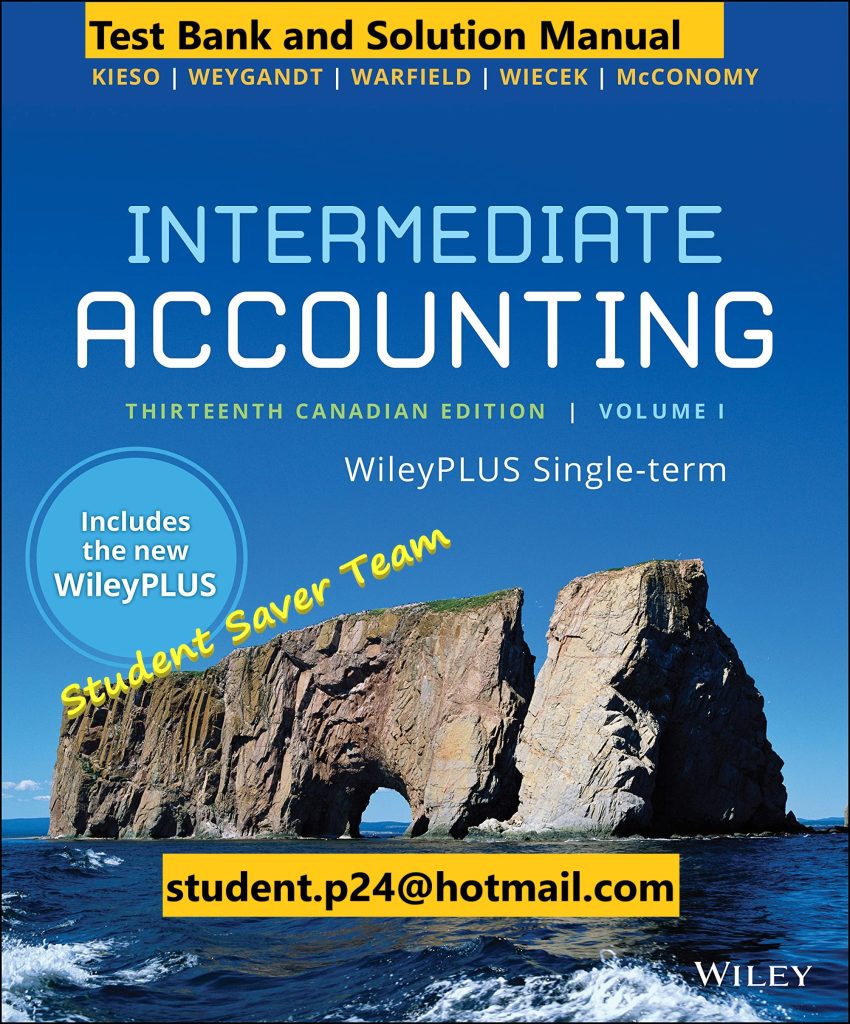Intermediate Accounting Volume 1 13th Canadian Edition E. Kieso J. Weygandt D. Warfield M. Wiecek J. McConomy Test Bank and Solution Manual
Intermediate Accounting, Volume 1, 13th Canadian Edition E. Kieso, J. Weygandt, D. Warfield, M. Wiecek, J. McConomy Test Bank and Solution Manual

Intermediate Accounting Volume 1 13th Canadian Edition E. Kieso J. Weygandt D. Warfield M. Wiecek J. McConomy Test Bank and Solution Manual
Product details
Intermediate Accounting Volume 1 13th Canadian Edition E. Kieso J. Weygandt D. Warfield M. Wiecek J. McConomy Test Bank and Solution Manual
-
- Publisher : Wiley (WileyPLUS Products); 13th edition
- (Feb. 14 2022)
- Language : English
- ISBN-10 : 1119740517
- ISBN-13 : 978-1119740513
- Item weight : 2.19 kg
- Best Sellers Rank: #92,166 in Books (See Top 100 in Books)
its the Test Bank and Solution Manual
To request/Order it .. Please contact us via e-mail
[email protected]
OR
you can use form contact by this link :
https://buy-testbank.com/contact-us/
OR
contact/chat us Via Whatsapp
https://wa.me/15873196042
OR
Message/Chat us by Telegram:
t.me/studentsaverteam
Example:
Hi ,
book name :
Intermediate Accounting Volume 1 13th Canadian Edition E. Kieso J. Weygandt D. Warfield M. Wiecek J. McConomy Test Bank and Solution Manual
IMPORTANT **
You will receive a response from us, just by this emails ..
[email protected]
or
[email protected]
any other email address , it is not us.
About the Book .. :
DESCRIPTION
Intermediate Accounting, 13th Canadian Edition has always been, and continues to be, the gold standard that helps connect students to the what, the why, and the how of accounting information. Through new edition updates, you will be able to spark efficient and effective learning and inspire and prepare students to be the accounting professionals of tomorrow.
To help develop a deeper understanding of course concepts and move beyond basic understanding, students work through a high-quality assessment at varying levels, helping them learn more efficiently and create connections between topics and real-world application. This course also presents an emphasis on decision-making through Integrated Cases and Research and Analysis questions that allow students to analyze business transactions, apply both IFRS and ASPE, and explore how different accounting standards impact real companies.
Throughout the course, students also work through a variety of hands-on activities including Data Analytics Problems, Analytics in Action features, Excel templates, and a new emphasis on sustainability, all within the chapter context. These applications help students develop an accounting decision-making mindset and improve the professional judgement and communication skills needed to be successful in the evolving accounting world.
Table of Contents : Volume 1
- The Canadian Financial Reporting Environment
- Conceptual Framework Underlying Financial Reporting
- Data, Decisions, and Measurement
- Reporting Financial Performance
- Financial Position and Cash Flows
- Revenue Recognition
- Cash and Receivables
- Inventory
- Investments
- Property, Plant, and Equipment: Accounting Model Basics
- Depreciation, Impairment, and Disposition
- Intangible Assets and Goodwill
NEW TO THIS EDITION
New emphasis on readability focuses on using fewer abbreviations, clearer language, shorter sentences, numbered lists, and clearer headings.
Re-structured Put into Practice exercises in each chapter make them more accessible for students.
Updates to the material have been made to ensure content is current and accurate. Where has been a significant change in an accounting standard or how it is applied, it has been highlighted with a significant change wordmark.
FEATURES
Develop Problem Solving Skills
Hundreds of algorithmic questions, available across all levels of Blooms taxonomy, help student learn accounting and develop problem solving skills.
Solve Business Problems with Excel
Excel Templates are available with select exercises and problems in the end-of-chapter material and give students an opportunity to practice using Excel functions within the accounting context. Questions with available Excel templates are labelled by an Excel Word icon to make it easier for instructors to incorporate Excel practice within homework assignments.
Develop Data Analytics and Literacy Skills
NEW! Analytics in Action Features and Videos use Power BI-based data visualizations and dashboards to tell the stories of various business scenarios. Over 20 author-created videos drill deeper into the visualizations and dashboards, helping further explain how data visualizations can be used to tell the story behind the numbers.
Additional Data Analytics Problems in the end-of-chapter material provide students with opportunities to analyze information and prepare simple visualizations using Excel. These problems range in difficulty and offer varied data sets, providing instructors with the flexibility to assign problems that are at the appropriate level for their students.
Ensure Your Course is Current
NEW emphasis on sustainability has been included throughout the course, including relevant cases and research assignments. Sustainability is growing in importance as accountants are increasingly being called on to collect data and prepare reports on sustainability, as well as providing assurance on such information, which is becoming more important to an increasing number of stakeholders.
Prepare Students for CPA Exam Success
NEW! CPA Competency Map Integration has been added which includes a mapping of the content in each chapter against the 2020 CPA Competency Map and Knowledge Supplement. This appears in Appendix D in WileyPLUS.
Assess Learning with Confidence
Develop and build upon students’ understanding of intermediate accounting applications and procedures with a heavily reworked test bank and questions varying in levels of difficulty including analysis problems, short answer, multiple-choice, analytics in action, Excel Templates, and more.
About the Authors:

Donald E. Kieso, Ph.D., CPA, received his bachelor’s degree from Aurora University and his doctorate in accounting from the University of Illinois. He has served as chairman of the Department of Accountancy and is currently the KPMG Emeritus Professor of Accountancy at Northern Illinois University. He has public accounting experience with Price Waterhouse & Co. (San Francisco and Chicago) and Arthur Andersen & Co. (Chicago) and research experience with the Research Division of the American Institute of Certified Public Accountants (New York). He has done post doctorate work as a Visiting Scholar at the University of California at Berkeley and is a recipient of NIU’s Teaching Excellence Award and four Golden Apple Teaching Awards. Professor Kieso is the author of other accounting and business books and is a member of the American Accounting Association, the American Institute of Certified Public Accountants, and the Illinois CPA Society. He has served as a member of the Board of Directors of the Illinois CPA Society, the AACSB’s Accounting Accreditation Committees, the State of Illinois Comptroller’s Commission, and he has served as Secretary-Treasurer of the Federation of Schools of Accountancy and as Secretary-Treasurer of the American Accounting Association. Professor Kieso is currently serving on the Board of Trustees and Executive Committee of Aurora University, as a member of the Board of Directors of Kishwaukee Community Hospital, and as Treasurer and Director of Valley West Community Hospital. From 1989 to 1993, he served as a charter member of the national Accounting Education Change Commission. He is the recipient of the Outstanding Accounting Educator Award from the Illinois CPA Society, the FSA’s Joseph A. Silvoso Award of Merit, the NIU Foundation’s Humanitarian Award for Service to Higher Education, a Distinguished Service Award from the Illinois CPA Society, and in 2003, an honorary doctorate from Aurora University.

Jerry J. Weygandt, PhD, CPA, is Arthur Andersen Alumni Emeritus Professor of Accounting at the University of Wisconsin-Madison. He holds a PhD in accounting from the University of Illinois. Articles by Professor Weygandt have appeared in the Accounting Review, Journal of Accounting Research, Accounting Horizons, Journal of Accountancy, and other academic and professional journals. These articles have examined such financial reporting issues as accounting for price-level adjustments, pensions, convertible securities, stock option contracts, and interim reports. Professor Weygandt is author of other accounting and financial reporting books and is a member of the American Accounting Association, the American Institute of Certified Public Accountants, and the Wisconsin Society of Certified Public Accountants. He has served on numerous committees of the American Accounting Association and as a member of the editorial board of the Accounting Review; he also has served as president and secretary-treasurer of the American Accounting Association. In addition, he has been actively involved with the American Institute of Certified Public Accountants and has been a member of the Accounting Standards Executive Committee (AcSEC). He has served on the FASB task force that examined the reporting issues related to accounting for income taxes and served as a trustee of the Financial Accounting Foundation. Professor Weygandt has received the Chancellor’s Award for Excellence in Teaching and the Beta Gamma Sigma Dean’s Teaching Award. He is the recipient of the Wisconsin Institute of CPA’s Outstanding Educator’s Award and the Lifetime Achievement Award. In 2001, he received the American Accounting Association’s Outstanding Educator Award.

Terry D. Warfield, PhD, CPA, is the PwC Professor in Accounting at the University of Wisconsin-Madison. He received a B.S. and M.B.A. from Indiana University and a Ph.D. in accounting from the University of Iowa. Professor Warfield’s area of expertise is financial reporting, and prior to his academic career, he worked for five years in the banking industry. He served as the Academic Accounting Fellow in the Office of the Chief Accountant at the U.S. Securities and Exchange Commission in Washington, D.C., from 1995–1996. Professor Warfield’s primary research interests concern financial accounting standards and disclosure policies. He has published scholarly articles in The Accounting Review, Journal of Accounting and Economics, Research in Accounting Regulation, and Accounting Horizons, and he has served on the editorial boards of The Accounting Review, Accounting Horizons, and Issues in Accounting Education. He has served as president of the Financial Accounting and Reporting Section, the Financial Accounting Standards Committee of the American Accounting Association (Chair 1995–1996), and on the AAAFASB Research Conference Committee. He also served on the Financial Accounting Standards Advisory Council of the Financial Accounting Standards Board, and he currently serves as a trustee of the Financial Accounting Foundation. Professor Warfield has received teaching awards at both the University of Iowa and the University of Wisconsin, and he was named to the Teaching Academy at the University of Wisconsin in 1995. Professor Warfield has developed and published several case studies based on his research for use in accounting classes. These cases have been selected for the AICPA Professor-Practitioner Case Development Program and have been published in Issues in Accounting Education. He served on the Board of the Illinois CPA Society, then AACSB’s Accounting Accreditation Committees, the State of Illinois Comptroller’s Commission, as secretary-treasurer of the Federation of Schools of Accountancy, and as secretary-treasurer of the American Accounting Association.

Irene M. Wiecek, FCPA, FCA, is a Professor of Accounting, Teaching Stream, at the University of Toronto, where she is cross-appointed to the Institute for Management & Innovation and the Joseph L. Rotman School of Management. She has taught financial reporting in various programs, including the Commerce Program (Accounting Specialist) and the CPA-accredited Master of Management & Professional Accounting Program (MMPA). The Director of the MMPA Program, she co-founded (in 2004) and was Director of the CPA/Rotman Centre for Innovation in Accounting Education, which supported and facilitated innovation in accounting education until 2018. Irene founded and currently directs the BIGDataAIHUB, an interdisciplinary space for faculty, students, and stakeholders to discuss and learn about issues related to big data and artificial intelligence. She has been involved in professional accounting education for many years, sitting on various provincial and national professional accounting organization committees. In the area of standard setting, she was a member of the IFRS Discussion Group (IDG) until 2020. Irene has authored and co-authored numerous publications and is on the editorial board of Accounting Perspectives. In 2019 she was appointed to the CPA Competency Map Task Force (which is taking a blank slate approach to creating a fresh CPA Competency Map, laying out the skills and competencies required of the future-focused CPA). She is a member of CPA Canada’s Data Governance Committee, which examines the prominent role that CPAs will continue to play in a data-rich environment.

Bruce J. McConomy, PH.D., CPA, CA, is a Professor of Accounting and a KPMG Foundation Fellow in Accounting at the Lazaridis School of Business and Economics at Wilfrid Laurier University in Waterloo, Ontario. He was a Senior Audit Manager with Deloitte before returning to Queen’s University to obtain his Ph.D. in accounting. Bruce is Director of the Graduate Diploma in Accounting program at Laurier and was Director of the CPA Ontario Centre for Capital Markets and Behavioural Decision Making, and its predecessor Centre, from 2005 to 2018. He has been teaching intermediate financial accounting since 2000 in Laurier’s B.B.A. and M.B.A. programs, and also teaches in Laurier’s Ph.D. in Management program. Bruce has published articles in Contemporary Accounting Research; Journal of Accounting, Auditing and Finance; Journal of Business, Finance and Accounting; Accounting, Auditing & Accountability Journal; Canadian Journal of Administrative Sciences; Critical Perspectives on Accounting; Accounting History; and Accounting Perspectives. He has also published cases in Issues in Accounting Education, Canadian Financial Accounting Cases—3rd edition, Accounting Perspectives, and Journal of Accounting Case Research. Bruce is a member of the Academic Advisory Committee of the Accounting Standards Board. He is also an Associate Editor and is on the Advisory Committee of Accounting Perspectives and is on the Editorial Advisory Board of the International Journal of Accounting & Information Management.
Note:
All solutions manual and Test Banks be in soft copy [Adobe Acrobat Reader (PDF )or Word format .Docx]
Best wishes,
Student Saver Team ,
================